Now look what you’ve gone and done, Francis!
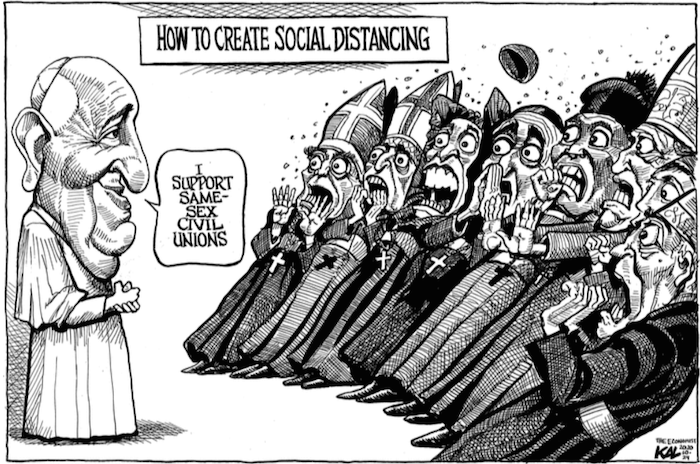

Alliance, Support & Activism

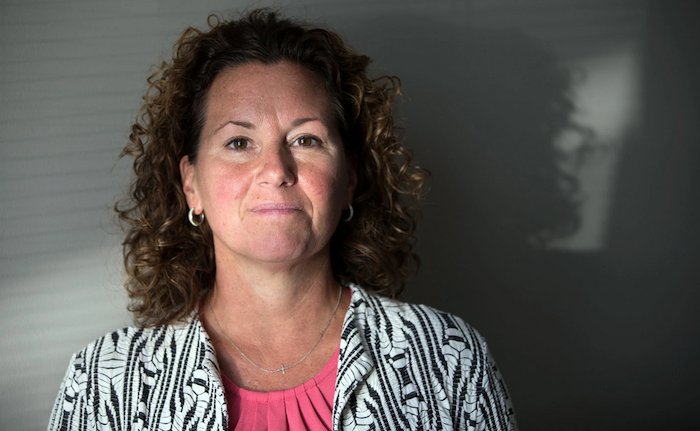
By Frank Bruni
Pat Fitzgerald, 67, has long loved being a Catholic, and the part he loved maybe most of all, for the past quarter-century, was his role as a spiritual mentor at retreats for students at a church-affiliated high school in Indianapolis, where he lives.
But he has been told that he’s not wanted anymore. His crime? He publicly supported his daughter, a guidance counselor at the school, after its administrators moved to get rid of her because she’s married to a woman.
The school’s treatment of Shelly Fitzgerald, 45, was a big local story last summer that went national; she ended up on “The Ellen DeGeneres Show” in September. It was one of many examples of Catholic institutions deciding almost whimsically to exile longtime employees — not priests or nuns but coaches, teachers, counselors — who had long been known to be gay but were suddenly regarded as liabilities.
Maybe they had quietly married their partners, formalizing those relationships and inadvertently drawing attention to themselves. Maybe some homophobic parent or congregant had belatedly learned about them and lodged a complaint. That’s what happened to Shelly Fitzgerald, and her 14 years of fine work at Roncalli High School no longer mattered. Only her 2015 marriage to her longtime partner did. She was told that she could stay on if she dissolved the union. She said no thanks and was kicked off school grounds in August.
The aftershocks still complicate the lives — and faith — of people around her: her students, their parents, her dad. On Facebook last month she posted a letter from him to the Roncalli community in which he explained that he’d just been disinvited from future retreats but thanked everyone for being such supportive friends over the years.
“Today my heart is broken,” he wrote, adding that the retreats he’d participated in — more than 40 in all — were “the most beautiful and holy settings I have ever witnessed.” He alluded only vaguely to his daughter’s case. “To people on both sides of this ongoing issue,” he wrote, “I hope you can find peace.”
But there’s no peace for the Catholic Church here. It’s too mired in its own hypocrisy. The tension between its official teaching and unofficial practice — between the ignorance of the past and the illumination of the present — grows tauter all the time.
Most Catholics support same-sex marriage, in defiance of the church’s formal position, and many parishes fully welcome L.G.B.T. people. Yet there are places, and times, when the hammer comes down.
Church leaders know full well that the priesthood would be decimated if closeted gay men were exposed and expelled. Yet the church as a matter of policy bars men with “deep-seated homosexual tendencies” and considers gay people “objectively disordered.”
Catholics are supposed to show compassion. Yet Shelly and her dad were shown anything but.
She has been on administrative leave since August, and last month her lawyer, David Page, filed a charge of discrimination against the school and the Archdiocese of Indianapolis with the federal Equal Employment Opportunity Commission. It has up to 180 days to respond.
On Tuesday morning he showed me paperwork for a second charge of discrimination that he said he would be filing imminently; it cites what happened to her father as an unlawful act of retaliation meant to dissuade Shelly from pressing her case.
Pat Fitzgerald, uncomfortable with media attention, declined to speak with me, preferring to let his daughter do the talking. “His struggle comes from caring about Roncalli and being in conflict with what they’ve done to me,” Shelly told me. In October he attended a protest against the church’s treatment of L.G.B.T. people. His sign said, “Please treat my daughter Shelly kindly.”
There is, by many accounts, profound anger and hurt at Roncalli. As it happens, Shelly was one of two directors of counseling there; the other, Lynn Starkey, 62, is in a same-sex civil union and in November filed her own charge of discrimination with the E.E.O.C., claiming a “hostile work environment” in the aftermath of Shelly’s departure. For now she remains on the job.
Many students started an L.G.B.T. advocacy group, Shelly’s Voice, that also attracted parents and other adults in the community. A related Facebook page, Time to Be a Rebel, has more than 4,500 members.
But one parent told me that students who question Shelly’s dismissal fear repercussions. “Seniors are being told that if they speak out, they take the chance of not being able to graduate,” the parent, who spoke with me on condition of anonymity, said.
Sign up for Frank Bruni’s newsletter
Get a more personal, less conventional take on political developments, newsmakers, cultural milestones and more with Frank Bruni’s exclusive commentary every week.
According to posts on the Facebook page, a small cluster of Roncalli students were invited last month to a lunch with Archbishop Charles C. Thompson of Indianapolis, only to have him stress that homosexuality is a disorder and its expression sinful. One student called it an ambush.
For comment on all of this, I contacted the Roncalli principal, who referred me to a spokesman for the archdiocese. The spokesman sent me a statement that said that Pat Fitzgerald’s exclusion from student retreats reflected the “continuing attention surrounding his daughter’s suspension” and “his own participation in public protests over Catholic Church teaching.” He was still welcome at Masses, the statement said.
In regard to Shelly’s suspension, a past statement from the archdiocese reiterated what the Catholic Church has said in similar cases: Employees of Catholic schools are expected to live in compliance with church teaching. But is that legally enforceable?
Shelly’s E.E.O.C. complaint tests where federal civil rights law covers sexual orientation, a matter on which courts in different areas of the country have disagreed. Also, the Catholic Church has attempted to claim a “ministerial exception” from nondiscrimination laws that conflict with religious tenets, but there’s continued dispute about whether this applies to workers, like Shelly, who aren’t in the clergy.
Shelly pointed out that the Catholic Church isn’t generally going after teachers who flout its rules by using birth control or divorcing or having sexual relations outside marriage. “They’re going after L.G.B.T. people,” she said. “They’re going to die on this hill.”
And they’re going to hurt people — like Shawn Aldrich, who attended Roncalli, just as his parents and his wife and her parents did. He has two children there now. What has happened to Shelly astounds him.
“She was phenomenal at her job,” Aldrich told me. “So why are we dismissing her?” He knows what church leaders say about homosexuality but noted, “It’s our church, too.” Besides, he said, “All of us are made in God’s image.”
He and his wife plan to end their family tradition. They won’t send their third child, now in seventh grade, to Roncalli. “And that breaks our hearts,” he said. “That absolutely breaks our hearts.”
Complete Article ↪HERE↩!
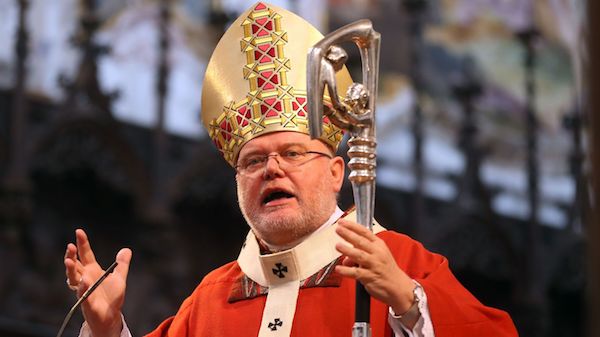
By Dan Avery
A German Cardinal is giving his blessing to priests who want to officiate same-sex unions.
Cardinal Reinhard Marx, Archbishop of Munich and Freising, told Bavarian State Broadcasting “there can be no rules” about whether clergy can bless such relationships. Rather, the decision should be made on a case by case basis.
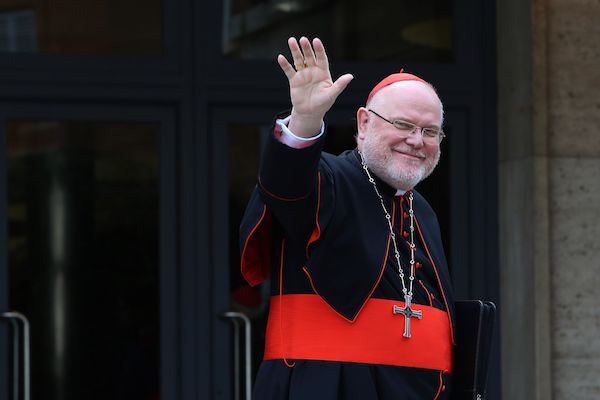
“One must encourage priests and pastoral workers to give people in concrete situations encouragement,” said the 73-year-old. “It’s about pastoral care for individual cases, and that applies in other areas as well, which we can not regulate, where we have no sets of rules.”
Marx, president of the German Bishops’ Conference, was responding to a question about why the Church is slow in moving forward on progressive causes like the ordination of women, blessings for homosexual couples, and the abolition of compulsory celibacy.
The important question, he said, was how “the Church can meet the challenges posed by the new circumstances of life today?”
Priests must take “the situation of the individual… their life story, their biography… their relationships,” into account, he added, rather than offer blanket regulations. The language and liturgical format of such blessings or other forms of “encouragement,” though, would require further consideration.
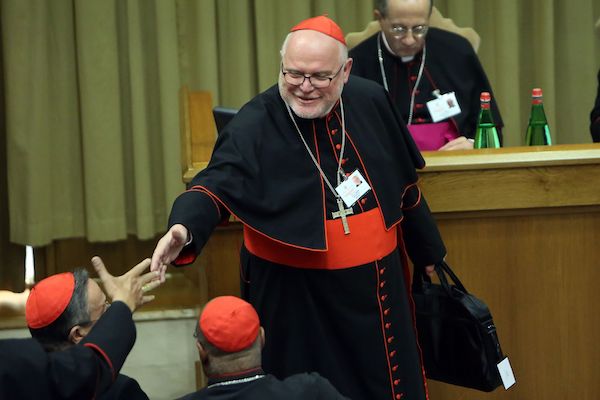
Marx previously called on the Church to apologize for centuries of anti-LGBT persecution.
“The history of homosexuals in our societies is very bad, because we’ve done a lot to marginalize [them],” he said in a 2016 talk at Dublin’s Trinity College. Calling the legacy of institutionalized homophobia “scandalous and terrible,” he added that, “As a Church and a society, we have to say ‘Sorry, sorry.’”
In 2014, Marx shocked attendees of the Synod of Bishops when he argued the Church couldn’t simply dismiss longtime same-sex relationships as worthless.
“We have to respect the decisions of people,” he said at the time. “You cannot say that a relationship between a man and a man and they are faithful [that] that is nothing, that has no worth.”
Complete Article ↪HERE↩!
By Samuel Smith
The majority of Americans who identify as religious say they favor allowing gays and lesbians to legally marry and oppose policies that would give business owners the right to refuse services to same-sex wedding ceremonies, according to data compiled by the Public Religion Research Institute.
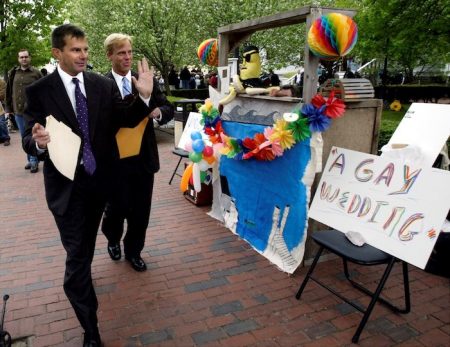
Last Friday, the Washington, D.C.-based polling firm released a new analysis drawn from interviews with 40,509 Americans throughout 2016 for PRRI’s American Values Atlas.
The data, which has an error margin of less than 1 percentage point, finds that the majority of only three religious demographics — white evangelical Protestants, Mormons and Jehovah’s Witnesses — said they oppose “allowing gays and lesbians to marry legally.”
While 58 percent of Americans said they support same-sex marriage, 61 percent of white evangelical Protestants, 55 percent of Mormons and 53 percent of Jehovah’s Witnesses signaled that they oppose the legalization of same-sex marriage, which happened in 2015 when the U.S. Supreme Court ruled that states cannot ban same-sex marriage, making it legal nationwide.
By comparison, only 28 percent of white Mainline Protestants and white Catholics, 25 percent of Hispanic Catholics and 30 percent of Orthodox Christians said they oppose allowing gays and lesbians to legally marry.
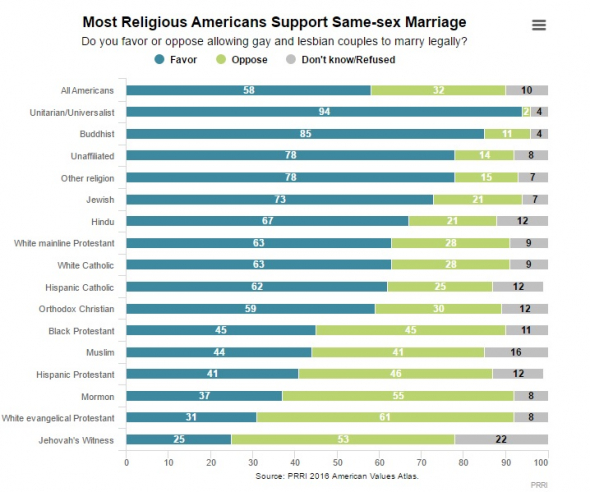 found that 54 percent of all Christians surveyed agreed that homosexuality should be accepted by society. Over half of all Roman Catholic, Mainline Protestant, Orthodox Christians and African-American Protestant respondents said they believe that homosexuality should be accepted in society, while only 36 percent of evangelical Protestants, 36 percent of Mormons and 16 percent of Jehovah’s Witnesses agreed.
found that 54 percent of all Christians surveyed agreed that homosexuality should be accepted by society. Over half of all Roman Catholic, Mainline Protestant, Orthodox Christians and African-American Protestant respondents said they believe that homosexuality should be accepted in society, while only 36 percent of evangelical Protestants, 36 percent of Mormons and 16 percent of Jehovah’s Witnesses agreed.
As reports have indicated in the last week that President Donald Trump is considering a possible “religious freedom order” that conservative religious freedom advocates say could do many things to protect the rights of religious institutions and federal contractors to operate their organizations in accordance with their beliefs, the PRRI data also shows that most American religious demographics oppose allowing businesses to refuse services for same-sex wedding ceremonies based on religious objections.
In recent years, small business owners across the U.S. were fined, sued and punished over their refusal to provide services for same-sex weddings because their participation would violate their religious beliefs. Advocates have called for state governments to give these religious business owners accommodations to non-discrimination laws, while opponents claim such exemptions would give these businesses a license to discriminate.
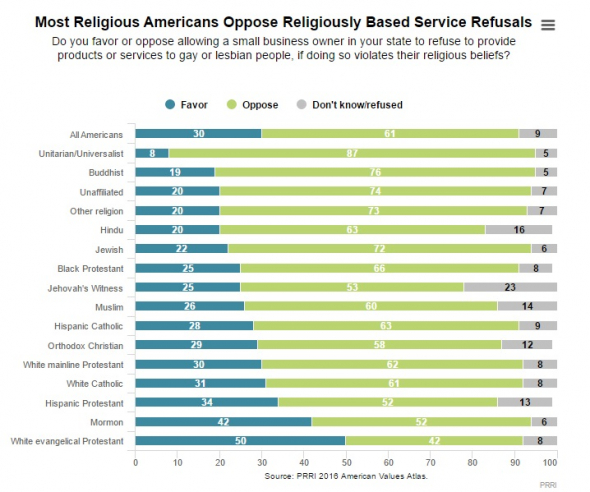 Complete Article HERE!
Complete Article HERE!
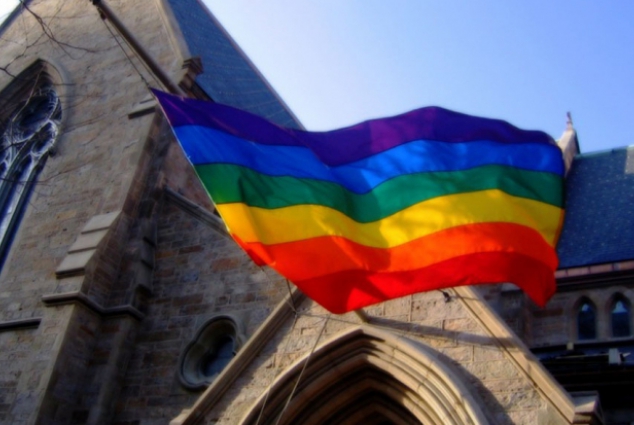
We have once again witnessed a devastating and horrific act of mass murder. On June 12, 2016 a violent young man and fellow citizen who was heavily-armed, psychologically-troubled, and professing hatred of LGBT people and allegiance to a radical and violent form of Islam killed 49 people and injured another 53. These kinds of mass shootings happen regularly in the United States; this is the most recent and the most lethal.
Many have responded with the usual statements about keeping those who have died and their loved ones in our thoughts and prayers. But some Catholic bishops have responded to the shootings at Pulse, the Orlando gay nightclub, in a way that goes beyond these all-too-familiar sentiments. Instead, these bishops seem to be adopting the much more inclusive pastoral vision of Pope Francis—a vision that embraces a “culture of encounter” with those with whom one has serious disagreements.
Bishop Robert Lynch of St. Petersburg, Florida called for a ban on weapons designed for mass killing and rejected barring all Muslims from the country as un-American. But this was not all he said. He also expressed dismay that religious people can express hatred and contempt for LGBT people in a way that makes acts of violence against them more likely.
Similarly, Archbishop Blase Cupich of Chicago decried gun violence and, addressing the gay and lesbian community as “our brothers and sisters,” said, “We stand with you.” Bishop Robert McElroy of San Diego, CA wrote, “This tragedy is a call for us as Catholics to combat ever more vigorously the anti-gay prejudice which exists in our Catholic community and in our country.”
To understand the true impact of the bishops’ words, one must also consider the other statements from the church regarding LGBT people. In 1997 the Committee on Marriage and Family Life of the United States Conference of Catholic Bishops (USCCB) released the document “Always Our Children: A Pastoral Message to Parents of Homosexual Children and Suggestions for Pastoral Ministers.” This document was warmly welcomed by some for the kind, pastoral tone it adopted. It was criticized for the same reason by others, who wanted a more rigorous emphasis on homosexual behavior as seriously sinful.
The Catechism of the Catholic Church states, “The number of men and women who have deep-seated homosexual tendencies is not negligible. This inclination, which is objectively disordered, constitutes for most of them a trial.” (Church officials using the terms LGBT or gay and lesbian is still a very recent and rare occurrence.) The catechism continues: “They must be accepted with respect, compassion, and sensitivity. Every sign of unjust discrimination in their regard should be avoided.”
Leaving aside for the moment the philosophical and technical meanings of the term objectively disordered, what is “unjust” discrimination? In 1992 the Congregation for the Doctrine of the Faith (CDF) released “Some Considerations Concerning the Response to Legislative Proposals on the Non-Discrimination of Homosexual Persons.” In this statement there is a condemnation of violence against gays and lesbians; however, there is also an acceptance of many other forms of “just” discrimination against LGBT people—in housing, employment, adoption, and military service. From this statement, it seems that the only unacceptable behavior against LGBT people is a violent attack.
The recent statements of the bishops responding to the tragedy in Orlando seem to go beyond the very mediocre, minimalist understanding of discrimination offered by the CDF. In a very Pope Francis-like move, these bishops directly or indirectly address some very challenging questions to the church itself. What does it mean for us to consider LGBT people “our brothers and sisters”? In what ways do Catholics breed contempt for LGBT people? Where can we find and how can we combat the anti-gay prejudice that exists in the Catholic community?
We need our bishops to give us guidance concerning the anti-LGBT prejudice and contempt that exists within the Catholic Church. A continuing silence is not morally courageous or pastorally responsible.
No normal human being should have any problem condemning acts of violence directed toward someone because of his or her sexual orientation. However, as a Catholic community, we need to do much more than just condemn violence. For example, it is legal in many states to fire someone for being gay, lesbian, or transgender. If we believe that this represents unjust discrimination, then how is it that our church is not on the front line working to end it? Surely we can’t congratulate ourselves because we explicitly condemn violence against LGBT people. Who doesn’t? Can’t we as a church do better than that? Shouldn’t we be actively doing something to end other forms of unjust discrimination?
Given the way that the Catholic Church has spoken about LGBT people and given the church’s stance against the moral acceptability of homosexual behavior and same-sex marriage, we will probably not be a welcome presence in the fight against LGBT discrimination, at least initially. However, that is all the more reason to speak out. If the Catholic Church is to have any moral credibility when we address issues like same-sex marriage or the natural moral ends of sexual intimacy, then we as Catholics must be willing to spend time and money fighting against injustices suffered by our LGBT brothers and sisters. We should not feel as if we need to change or water down our moral teachings, but we should look and act a lot more like Jesus Christ in our fight for justice. This is one of the more powerful lessons we should be learning from Pope Francis.
For some, the only experience they might have of the Catholic Church is being told that they or their favorite uncle, kindest teacher, or most generous neighbor is “gravely disordered,” “intrinsically evil,” or an “abomination.” In the face of having their dignity or that of the people they love diminished and insulted, these people, without an understanding of the technical vocabulary of moral theology, may conclude that it is the church itself that is “gravely disordered” or “intrinsically evil.” In order to persuade them that this is not the case, the Catholic Church should be much more willing to work in solidarity with and on behalf of communities that are suffering unjustly, even when we do not agree with all the beliefs of that community.
Complete Article HERE!
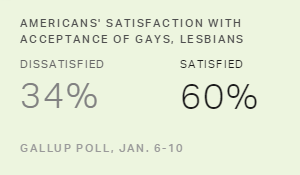
by Justin McCarthy
WASHINGTON, D.C. — A new high of 60% of Americans say they are satisfied with the acceptance of gays and lesbians in the U.S. — up from 53% in 2014 and 2015. As recently as 10 years ago, satisfaction was as low as 32%.
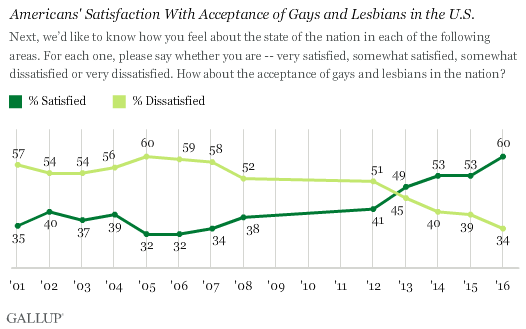
The latest data, from Gallup’s annual Mood of the Nation survey conducted Jan. 6-10, come after a landmark year in achievements for the gay rights movement. Most notably, the U.S. Supreme Court invalidated state laws that banned same-sex marriage. Prior to the court’s decision last year, 60% of Americans supported gay marriages.
Gallup first polled on Americans’ satisfaction with acceptance of gays and lesbians in 2001, when about a third reported being satisfied. Over the next eight years, this figure hovered between 32% and 40%. The level of satisfaction climbed in each poll between 2006 and 2014 amid a state-by-state battle for marriage rights. During this time, the federal government also repealed the military’s “don’t ask, don’t tell” policy and the Supreme Court struck down much of the federal Defense of Marriage Act.
Gallup asks Americans who say they are dissatisfied with the acceptance of gays and lesbians if that dissatisfaction stems from their desire to see more acceptance or less acceptance. Similar percentages currently choose each explanation. Both of these figures have declined over the years as overall satisfaction has climbed, with a much greater decline in the percentage who are dissatisfied and want less acceptance.
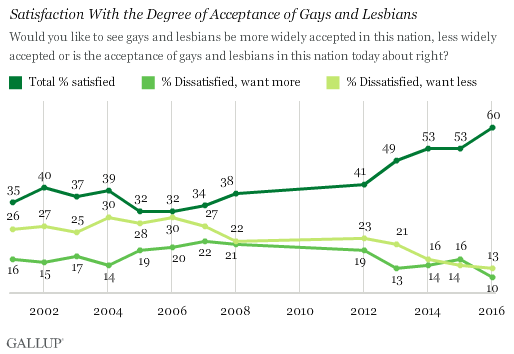
Majorities of All Party Groups Satisfied With Gay Acceptance in U.S.
The latest poll marks the first time that majorities of Americans from within the three major political identifications report being satisfied with acceptance of gays and lesbians in the U.S. Democrats remain the most satisfied (67%), as they have been since 2012. Meanwhile, 59% of independents and 54% of Republicans report being satisfied on the issue.
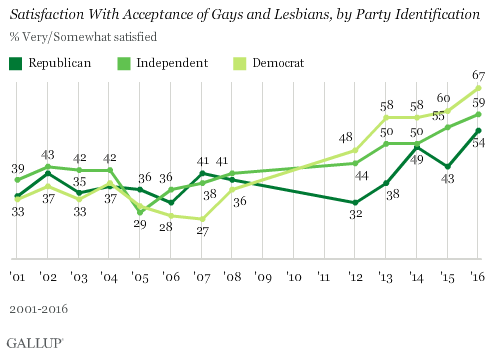
Over the past 15 years, Democrats were least satisfied — ranging between 27% and 38% in satisfaction — during the administration of President George W. Bush, a Republican president who called for a constitutional amendment to ban same-sex marriage as he campaigned for re-election in 2004. But as Democratic President Barack Obama completed his first term in office in 2012, Democrats’ satisfaction climbed to 48% and has gained 19 percentage points in the years since.
Satisfaction among the GOP has been a lot tamer, ranging from 32% to 41% from 2001 to 2013. Though Republicans were generally more satisfied than Democrats during the Bush presidency and the least satisfied group during the Obama presidency, the percentage of those who report being satisfied has climbed quite a bit over Obama’s second term.
Bottom Line
The past decade has seen significant progress for the gay rights movement in the U.S., and along with that, a greater acceptance of gays and lesbians in the country more generally. Now a new high of 60% of Americans are satisfied with the acceptance of gays and lesbians in the U.S., nearly doubling the 32% from 10 years ago.
But despite being in the minority, there are many Americans who are unhappy with the advancements made in gay rights, and there are judges, religious figures and GOP presidential candidates who seek to undo what gay rights supporters have achieved. Meanwhile, another faction of Americans are dissatisfied because they seek more acceptance for gays and lesbians — perhaps in response to continued efforts to walk back newly achieved gay rights, hate crimes against LGBT people and other acts of intolerance directed at the community.
Still, a stronger majority than ever before is content with the current state of gay acceptance in the U.S. Given the generational differences Gallup has found among supporters of gay rights, it is likely that satisfaction will continue to grow as younger generations supplant older ones.
Historical data are available in Gallup Analytics.
Survey Methods
Results for this Gallup poll are based on telephone interviews conducted Jan. 6-10, 2016, with a random sample of 1,012 adults, aged 18 and older, living in all 50 U.S. states and the District of Columbia. For results based on the total sample of national adults, the margin of sampling error is ±4 percentage points at the 95% confidence level. All reported margins of sampling error include computed design effects for weighting.
Each sample of national adults includes a minimum quota of 60% cellphone respondents and 40% landline respondents, with additional minimum quotas by time zone within region. Landline and cellular telephone numbers are selected using random-digit-dial methods.
Learn more about how Gallup Poll Social Series works.
Complete Article HERE!
Before the 14th Ordinary General Assembly of the Synod of Bishops even began, it was obvious it would be no friendly gathering of the Catholic Church’s leaders and laity when it came to gay rights and other social issues.
While Pope Francis’ message of greater inclusion often played well with the press and a significant fraction of the faithful, some conservative cardinals, archbishops and bishops responded with negativity, anger and outright derision.
Cardinal Raymond Burke said that the pope “cannot change church doctrine.” A controversial letter signed by 13 of the most conservative cardinals and archbishops, including New York’s Cardinal Timothy Dolan, and delivered as the synod was about to begin, criticized the process, saying it was “designed to facilitate predetermined results.”
The pontiff called the synod to discuss “the vocation and mission of the family in the church and in the contemporary world.” And outside the Vatican walls, the very definition of family in the contemporary world has changed. Catholics get divorced and remarried. Catholic congregants and even priests are now openly gay.
But as the world’s Catholics read the bishops’ official account of the synod, gay Catholics were bound to be disappointed. While the document said they should be “treated with respect” and should not fall victim to “unjust discrimination,” it effectively shut the door on same-sex marriage.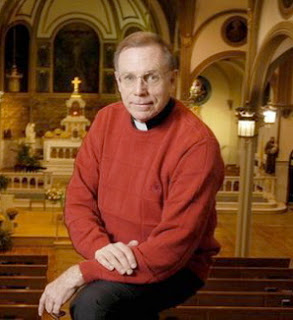
In America many gay Catholics, gay priests and their supporters in the church are still hewing to Francis’ message of more tolerance and openness. They believe that the debate over the church’s attitude toward LGBT issues has only just begun and that the results of the synod are not going to derail it. Their lives and experiences reveal that in America there is a thriving culture of gay Catholics who openly embrace both their faith and their sexuality.
A 2004 report by the John Jay College of Criminal Justice in New York put the number of gay priests and seminarians at anywhere from 15 to 58 percent. One of those priests is the Rev. Fred Daley, now the pastor at All Saints Parish in Syracuse, New York. Spurred by what he called the “scapegoating” of gay priests during the church’s sex abuse scandal, Daley came out in 2004. He had been a priest for 30 years.
His story shows the anguish that many gay priests often feel. When he first thought about becoming a priest, he says, his sexuality wasn’t an issue. “To be honest,” he says, “growing up as a kid in high school, I had no inkling of being gay.” He was three or four years into his priesthood, he says, when reality struck. “I became in touch with a sort of ache within me that was really my sexuality sort of bubbling forth, and I began to be in touch with sexual attractions, and I was horrified. I thought this was terrible and I’m going to go to hell.”
He worked with a Jesuit spiritual adviser who, he says, “put me on a journey of recognizing my orientation, accepting it and ultimately rejoicing in who God created me to be.” It was a process that took nearly 10 years, and at the end of it, he says, “I was freely able to choose celibacy, because I really continued to feel the strong call to ordained ministry. But I discovered that I had the capacity for intimacy.”
Celibacy is one of the the things that define the Roman Catholic priesthood. Priests may be gay or straight, as long as they’re celibate. When asked about gay priests, Francis famously said, “If someone is gay and he searches for the Lord and has goodwill, who am I to judge?” That’s miles from his predecessor Benedict XVI, who in 2005 signed a document that said men with “strong gay tendencies” should not be priests and, as Cardinal Joseph Ratzinger in 1986, authored a letter, approved by Pope John Paul II, calling homosexuality “intrinsically disordered.”
That change in attitude has been embraced by gay Catholics, who have struggled to keep faith with a church that, at the top, has refused to recognize or respect the movement for LGBT rights.
There is no mention of homosexuality in the church’s canon law. Even sodomy laws, she says, refer to “two heterosexual men having sex in order to honor a false god in a ritual.” She believes the conservative opposition to gays in the church comes largely from outdated rules.
Daley agrees. “I would say a considerable number of the clergy have not updated themselves on what is the contemporary understanding of what is sexual orientation,” he says. “They’re mouthing what they learned 30 or 40 years ago, which is a real problem.”
But that is an opinion from an American priest. One thing that is increasingly defining Catholicism’s future tackling of LGBT rights is the church’s changing demographics.
Because while Catholicism struggles to hold on to the faithful in its traditional strongholds like Europe, the U.S. and Latin America, the numbers are growing at a rapid pace in one part of the world known for its cultural hostility to gay rights: sub-Saharan Africa.
Since 1980, the number of Catholics in Africa has grown by 238 percent. Perhaps more important, 70 percent of them attend Sunday Mass regularly, compared with just 29 percent in the Americas. Some countries with the fastest growth — Uganda, Nigeria and Kenya — have or are considering laws that make homosexual acts punishable by long prison terms or, in some cases, execution.
But the numbers can’t be ignored, and African bishops are leading the charge against the progressives and reportedly to a bigger role in the synod. Longtime Vatican observer John Allen, who covered the synod for Crux, writes that progressives “met stiff resistance from several African bishops who no longer consider themselves junior partners in Catholicism Inc. This time, they’re ready for the boardroom.”
The synod ended on Oct. 25, and the bishops’ report was released almost immediately. While the language was open to interpretation, two things were clear: Little is likely to change, and a full third of the bishops dissented from the pope’s positions. But Francis can accept the document, ignore it or make any changes he wants to it. His is the final word, and it’s his emphasis on mercy that gives gay Catholics what Olivares calls “little flickers of hope.”
“I tell my friends, ‘Look, we’ve been knocking this whole time on the door asking the church to let us in. Are we going to leave before they even answer the door?’” he says.
Lewis Speakes-Tanner, the president of Dignity USA, says he has seen small changes, small victories for LGBT Catholics. “There are a lot of good priests and good bishops who are willing to help and to do things behind the scenes,” he says. “Unfortunately, under the years of Pope John Paul II and Benedict, they weren’t allowed really to have a voice because if they spoke up, they were quickly silenced by the bishops. Under Francis, more people are able actually to speak.”
For Daley, the Francis effect has already begun. “What Francis has done, which I think has affected gay people as well as everyone else, is he has a different sense of priorities. Doctrine is important, but it’s not No. 1. Mercy, compassion, understanding come before doctrine. And he also makes it clear that, ultimately, we have to follow our consciences.”
Complete Article HERE!
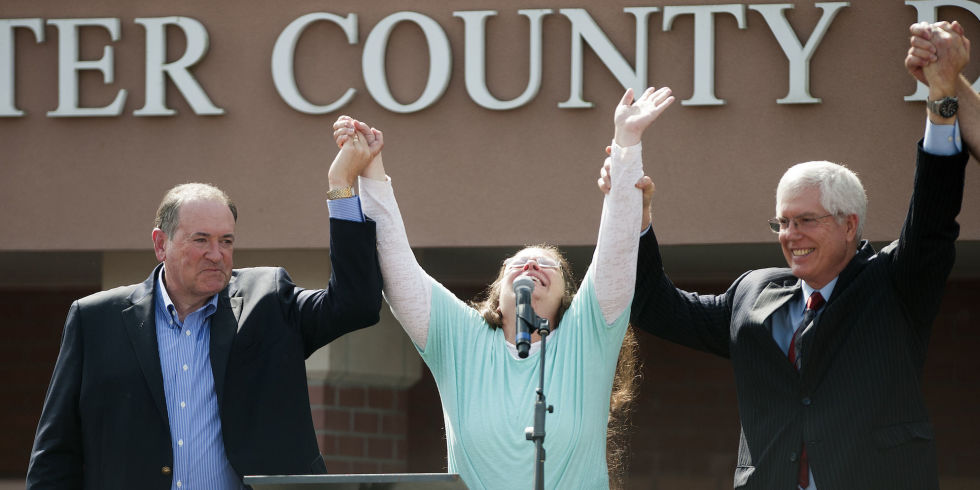
The big news today seems to be that Kim Davis, the goldbricking county clerk from Kentucky, met secretly with Papa Francesco in Washington and that he endorsed her current status as a faith-based layabout. Given this pope’s deft gift for strategic ambiguity and shrewd public relations, it’s hard for me to understand how he could commit such a hamhanded blunder as picking a side in this fight. And it’s odd that he (or someone) sought to publicize it through an American media entity that is not wholly sympathetic to his papacy. Inside The Vatican, the e-newsletter that broke the story, is edited by Robert Moynihan, a 79-year old whose patron was Benedict XVI.
God, the crowing from the Right is going to be deafening. Everything he said about capitalism and about the environment is going to be drowned out because he wandered into a noisy American culture-war scuffle in which one side, apparently the one he picked, has a seemingly ceaseless megaphone for its views. What a fcking blunder. What a sin against charity, as the nuns used to say.
This is, obviously, the dumbest thing this Pope ever has done. It undermines everything he accomplished on his visit here. It undermines his pastoral message, and it diminishes his stature by involving him in a petty American political dispute. A secret meeting with this nutball? That undermines any credibility he had accrued on the issue of openness and transparency. Moreover, it means that he barbered the truth during the press conference he held on his flight back to Rome, in which he spoke vaguely about religious liberty, and freedom of conscience, but claimed, “I can’t have in mind all cases that can exist about conscience objection.” He certainly knew the details of this case.
I really wish I could blame this on some shadowy Vatican cabal. Not that there aren’t some really weird elements to the story.
In case you were wondering about the publication that got the message out, it’s an e-newsletter whose editor-in-chief, Moynihan, is entirely a creature of the Catholic Right, at least as far as his career as a journalist is concerned. He was originall encouraged in his efforts by then-Cardinal Josef Ratzinger, and he built his publication specifically to take advantage of the climate of apologetics among conservative Catholics that Ratzinger best represented.
I then began making calls—to Phil Lawler, to Father Richard Neuhaus, to David Schindler, to Deal Hudson (who at that time was known as a Maritain scholar), to Stratford Caldecott, and to many others. I was seeking insight into what people thought was needed. What message would The Catholic World Report proclaim? I knew I did not want it to be superficial or knee-jerk; I wanted it to be profound, provocative, and fearless, looking at the world from a thoroughly Catholic perspective. One great concern I had was that we would be “too American.” Then Father Fessio explained that we would not be alone, but together with some French and Spanish editors in a group which would be called “I.Media,” short for “International Media.” The French would be financed by Vincent Montagne’s publishing group, Media-Participations, the largest Catholic publisher in France, and the Spanish by the Legionaries of Christ.
That list is more than something of a tell. His good friend, Father Joseph Fessio, is an important figure among American conservative Catholics. He founded Ignatius Press, and he was twice fired from his posts at Ave Maria University, the bungled attempt at creating a papist Bob Jones University—and recreating Franco’s Spain around it—in Florida funded by pizza billionaire Tom Monaghan. Lawler writes for an extremely conservative Catholic website, and he once chastised Sean Cardinal O’Malley because, in a sermon he’d given after the Boston Marathon bombings, O’Malley had mentioned this country’s lax gun-control laws as contributing to a “culture of death” which included abortion, and that O’Malley had failed to use the words “Islamic terrorism” in reference to the bombing. The late Father Neuhaus was the crackpot editor of First Things, in which he once published a symposium that appeared to call on American Catholics to commit sedition. Deal Hudson founded and edited Crisis, a conservative Catholic journal, and was the director of Catholic outreach for George W. Bush’s campaigns in 2000 and 2004. Hudson was forced to resign from a position at the Republican National Committee under very strange circumstances. And space limitations preclude discussing all the horrors of the Legionaries of Christ, which Moynihan says financed the Spanish edition of his publication.
There is no question that the conservative Catholic backlash began as a response to the ever-detonating scandal involving the sexual abuse of children by Catholic clergy, and the international conspiracy to obstruct justice that followed. An explosion of revelations was followed by a well-financed explosion of apologetics. The latter emphasized that liberal Catholics were using the scandal to attack the Church generally. I wrote extensively about it at my previous gig. This did not abate during the papacy of Benedict XVI, and there exists a kind of silent civil war in Catholicism that continues to this day.
(It’s here where I should mention that there is a serious line of thought among Catholic conservatives that Benedict was forced into retirement by a cabal of liberals. There’s even a new book on the subject that Rod Dreher found interesting, although I have to admit that, every time I hear the author’s name—Gottfried Danneels!—I hear it in the voice of W.C. Fields.)
So not only has the pope trashed whatever good will he’d accrued here, he (or someone) did so through a publication aligned with the forces in the church opposed to everything for which his papacy allegedly stood. He did a really stupid thing and he (or someone) is dealing with the dingier elements of the religious media to get the news out. Somebody needs to get fired behind this. Who are you to judge, Papa Francesco? I’m afraid you just did. I will pray for you, because, damn, son, you need it.
Complete Article HERE!

A Catholic university in New York City has said it will take no action against the chair of its theology department after he married his same-sex partner on June 27, in contrast to the several parochial K-12 schools that have fired gay and lesbian employees who marry.
The marriage of Fordham University Theology Professor J. Patrick Hornbeck and Patrick Bergquist — who directs the family ministry of St. Bartholomew’s Episcopal Church in Manhattan — was announced in the “Weddings” section of the New York Times the day after their ceremony.
In response to an inquiry from BuzzFeed News, Fordham University provided a statement from Senior Director of Communications Bob Howe saying that university wished the best for Hornbeck and his husband.
“While Catholic teachings do not support same-sex marriage, we wish Professor Hornbeck and his spouse a rich life filled with many blessings on the occasion of their wedding in the Episcopal Church. Professor Hornbeck is a member of the Fordham community, and like all University employees, students and alumni, is entitled to human dignity without regard to race, creed, gender, and sexual orientation,” Howe said in a statement that had been released previously. “Finally, same-sex unions are now the law of the land, and Professor Hornbeck has the same constitutional right to marriage as all Americans.”
Fordham’s response to Hornbeck’s marriage has been attacked in a number of conservative Catholic websites over the past two weeks, apparently beginning with Patheos.
Fordham University describes itself as “both Catholic and Jesuit” in identity, and invokes Catholic doctrine in other areas, including prohibiting the distribution of birth control.
“As an institution in the Catholic, Jesuit tradition, Fordham University follows Church teachings on reproductive issues,” states the university’s student handbook. “Distribution of contraceptives, contraceptive devices and/or birth control, in any form, is prohibited on Fordham University property and at University-sponsored events.”
The New York Archdiocese did not immediately respond to a request for comment on Fordham’s response to Hornbeck’s marriage. Neither Hornbeck nor his husband could be reached for comment.
Hornbeck’s marriage follows controversies in several archdiocese around the country where gay and lesbian teachers at Catholic K-12 schools have been fired after marrying their same-sex partners. The most recent firing to make national news was at the Waldron Mercy Academy just outside Philadelphia, where the archdiocese will host a large family summit in September that is schedule to include a visit by Pope Francis.
The Academy notified parents at the end of the school year that it was not renewing the contract of its longtime director of religious education, Margie Winters, because of her marriage to Andrea Vettori. Vettori appealed directly to the pope to intercede in a letter made public on July 1.
Philadelphia Archbishop Charles Chaput praised Winters’s firing as showing “character and common sense at a moment when both seem to be uncommon.”
Complete Article HERE!